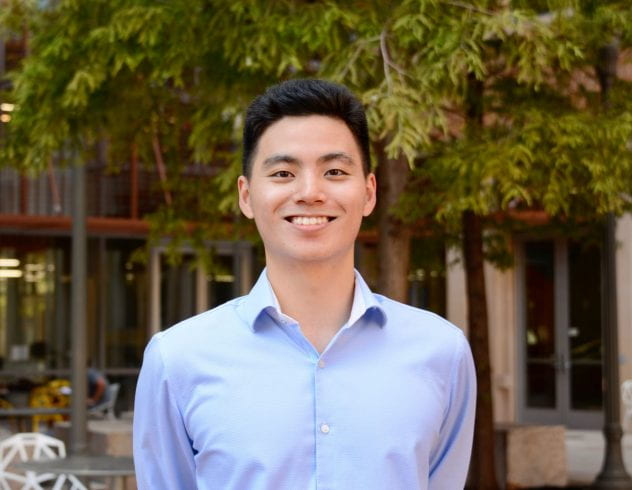
Kevin Qi
Topics of Interest: Texas CSB, CSBA, Computer Science, Business, Student Involvement, Career Orientation
As the business world evolves and incorporates more and more tech, it’s essential that programs exist, like Texas CSB (Texas Honors Computer Science and Business), an integrated honors dual-degree program between the Canfield Business Honors Program and the Department of Computer Science.
We caught up with junior Kevin Qi, the current president of the Computer Science Business Association, a student organization led by Texas CSBers, to learn about the organization and what’s new. Keep reading to learn more about his experience leading the club!
For the third year in a row, Qi is the president of the Computer Science Business Association. The organization is specifically for CSB students and it was founded in his freshman year of college.
“It’s crazy to see how the club has grown,” Qi said. “Since CSB is growing every year with each newly admitted class, we have like 70 people right now – but I still remember my freshman year when we only had 20 people.”
Qi said that CSBA does a lot of events, including socials, career events, resume building, and mock interviews. They also have sponsors from real corporations like Capital One and Optiver.
“Our sponsors really see our value in a business and CS degree,” Qi said. “Employers are looking for people who are not only technically skilled but can also work with people. As computer science and business students, we can fill lots of these roles through product management, quantitative trading, and potentially even tech consulting.”
As president of CSBA, Qi works closely with other members of the organization to make sure the club runs smoothly. Chris Wang, the student who gathers sponsors, has put a lot of effort into CSBA to ensure the needs of the CSB community are met. Additionally, club members Joyce He and Tejas Mehta started the Managing Interest for Mentorship in Industry (MIMI) program which has been continued by Julia Hathaway.
On his involvement in CSBA, Qi said, “I feel like it’s really important to provide a sense of community to CSB students because it’s hard when they’re at the intersection of being in CBHP and Turing, so they’re trying to find a sense of where they belong – are they in business or computer science?”
Qi said CSB was meant to provide that sense of community and say, “Hey, you belong in this intersection.” Since there’s a group just for that, he wanted to also foster tight-knit relationships and enable people to know each other really well in the program.
“We already have a small cohort, which helps, but giving them opportunities to meet each other and hang out to grow bonds socially and professionally, I think is very important,” Qi said.
Canfield BHP student, Jeffrey Wang, originally started CSBA. He was in an older program called Turing Scholars, a separate undergraduate honors program at the Department of Computer Science. Qi had some leadership experience in high school from his Student Council, so he wanted to step up and run the club.
“I ran for president and got re-elected last year,” Qi said. “I feel great that my peers trusted me to lead the group and help bring those community vibes to the program.”
Qi also spoke about the advantages of having a CSB-specific club. “The first thing is obviously the dual-degree. You graduate with two degrees in four years, which is already a big plus in terms of the amount of knowledge you learn,” Qi said. “Also career opportunities; a lot of the CSB students don’t know whether they want to do more business or more computer science in their career, so CSB allows for expansion of both knowledge and career opportunities that are out there.”
Qi said sometimes people ask, “Why would you want to do two majors?”. Though it does involve a bit more work, Texas CSB helps students develop time management skills as they navigate challenging workloads every semester from freshman and sophomore year.
“It eases off junior and senior year once you’re done with your business or CS core”, Qi said. “Now, I’m able to graduate with two degrees in four years. It’s a grind the first two years, but as a junior, it’s definitely rewarding to see how far I’ve come.”
Qi says the biggest advice he would give to freshmen is that they don’t need to have it all figured out. A lot of freshmen feel the need to pigeonhole themselves as soon as they get into college, but the benefit of this dual-degree is that they have the opportunity to explore.
“Use your internships as a chance to explore those career fields, whether that be software engineering or consulting or anything else,” Qi said. “Don’t think you need to come in as a freshman with a career path. The whole point is to open doors.”
